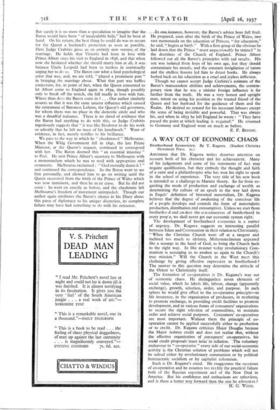A WAY OUT OF ECONOMIC CHAOS
ANYTHING - that Dr. Kagawa writes deserves attention on account both of his character and his achievethent. Many of his judgements and some of his statements of fact may require qualification, but they embody the thought and faith of a saint and a philanthropist who has won his right to speak in the school of experience. The very title of his new book is intended as a challenge to Marxist theory. So far from re- garding the mode of production and exchange of wealth as determining the culture of an epoch in the way laid down in Engels' definition of historical materialism, Dr. ICaliawa believes that the degree of awakening of the conscious 'life of a people 'develops and controls the form of materialistic production, distribution and consumption. Unless we start from brotherhot d and awaken the ccn3ciousness of brotherhood in every people, we shall never get our economic system right.
The development of brotherhood esonomics is a matter of urgency. Dr. Kagawa suggests an interesting parallel between Islam and Co:nmunism in their relation to Christianity. " When the Christian Church went off at a tangent and inclined too much to idolatry, Mahommedanism appeared like a scourge in the hand of God, to bring the Church back to the right way. In like manner today revolutionary Com- munism is scourging us to awaken us again to the Church's true mission." Will the Church in the West meet this challenge by giving effective expression to brotherhood ? The answer to this question may determine the attitude of the Orient to Christianity itself.
The formation of co-operatives is Dr. Kagawa's way out of economic chaos. He distinguishes seven elements of social value, which he labels life, labour, change (apparently exchange), growth; selection, order, and purpose. In each sphere he would`give effect to the co-operative principle=in life insurance, in the organisation of producers, in marketing to promote exchange, in providing credit facilities to promote development, and in various forms of consumers' organisations to secure the right selection of commodities, to maintain order and achieve social purposes. Consumers' co-operatives are most important. Without them the principle of co- operation cannot be applied successfully either to production or to credit. Dr. Kagawa criticises Major Douglas because the Major isolates credit and does not realise that, without the effective organisation of consumers' co-operatives, his social credit proposals must issiVidinfiation. The voluntary endeavour to " co-operatise " every side of our social-economic activity is the Christian solution of problems which will-not be solved either by revolutionary communism or by political bureaucratic socialism or by capitalist reformism.
Stich is Dr. Kagawa's creed. He exaggerates the successes
of co-operation and he assumes too readily the practical failure both of the Russian experiment and of the New Deal in America. But his confidence and enthusiasm are infect and is there a better way forward than the one he advocat es ? —II G. WiRio.






















































 Previous page
Previous page